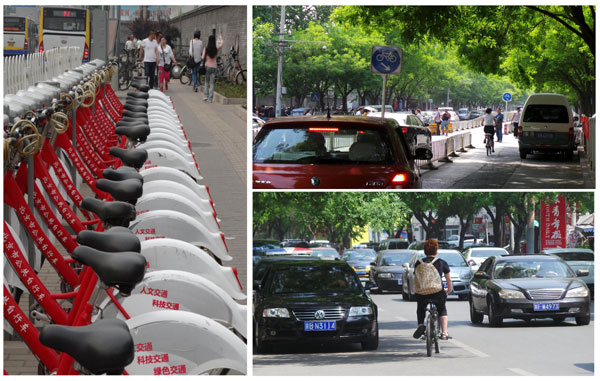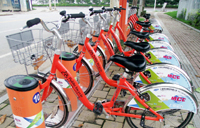 |
|
Public rental bikes stand idle along bicycle lanes occupied by cars in Dongcheng district of Beijing, June 3, 2013. [Photo/Xinhua] |
 |
| 'Kingdom of Bicycles' rises again |
 |
| Cash needed to grease wheels of the public bike system |
Although the plan backfired - the bikes were confiscated by police - it offered a glimpse of the future. That playful act of defiance has gone mainstream, and with the bike-sharing boom still in its first decade, Asia is already outpacing the European towns and cities that gave birth to the phenomenon.
Hangzhou in Zhejiang province and Wuhan in Hubei province are the global leaders, but it is struggling to take off in India's megacities. The United States is playing catch-up and Africa is a no-show.
As the craze swept east, China became dominant and India struggled. In seven years, China has gone from having no public bikes to 650,000, dwarfing France's fleet of 47,000.
China started to replace bikes with cars in the 1980s as it focused on expanding its economy quickly. Now, confronted by toxic smog and traffic jams, it has re-embraced the tradition only recently shunned as backward.
In 2008, it was introduced in the port of Hangzhou, with a fleet of 2,800 bikes, which has grown to 65,000.
The idea is simple. You get a key or a set of codes to unlock a bike from one of many stations scattered around a city. The first 30 minutes to an hour are typically free. After a journey, you park at the self-locking dock at or near the destination.
From flat Astana in Kazakhstan, to Quito in Ecuador, set at an altitude of almost 3.2 km, there is now a bike-sharing program in more than 600 cities in 52 countries, according to Russell Meddin, who maintains and updates The Bike-Sharing World Map, a website that surveys cycle plans worldwide.
The Philadelphia-based cycling fan, who has sampled programs in China, Europe and North America, said 68 new ones have been introduced this year - a rate of two a week.
European cities with compact downtown areas, such as Milan and Barcelona, are more appealing to cyclists than the car-clogged streets of sprawling Karachi and Lagos.
This may explain why the concept was introduced in the northern French town of Rennes, where 200,000 residents got to try the first computerized system virtually for free in 1998. Paris adopted it in 2007.
Boasting a network of 20,600 bikes every 300 meters, the French capital served as a model for London, New York and beyond.
"I call it the big bang," said Meddin. "You have to go big right away and not waste your time trying to test it out first on a small scale. That just doesn't work."
Bloomberg
